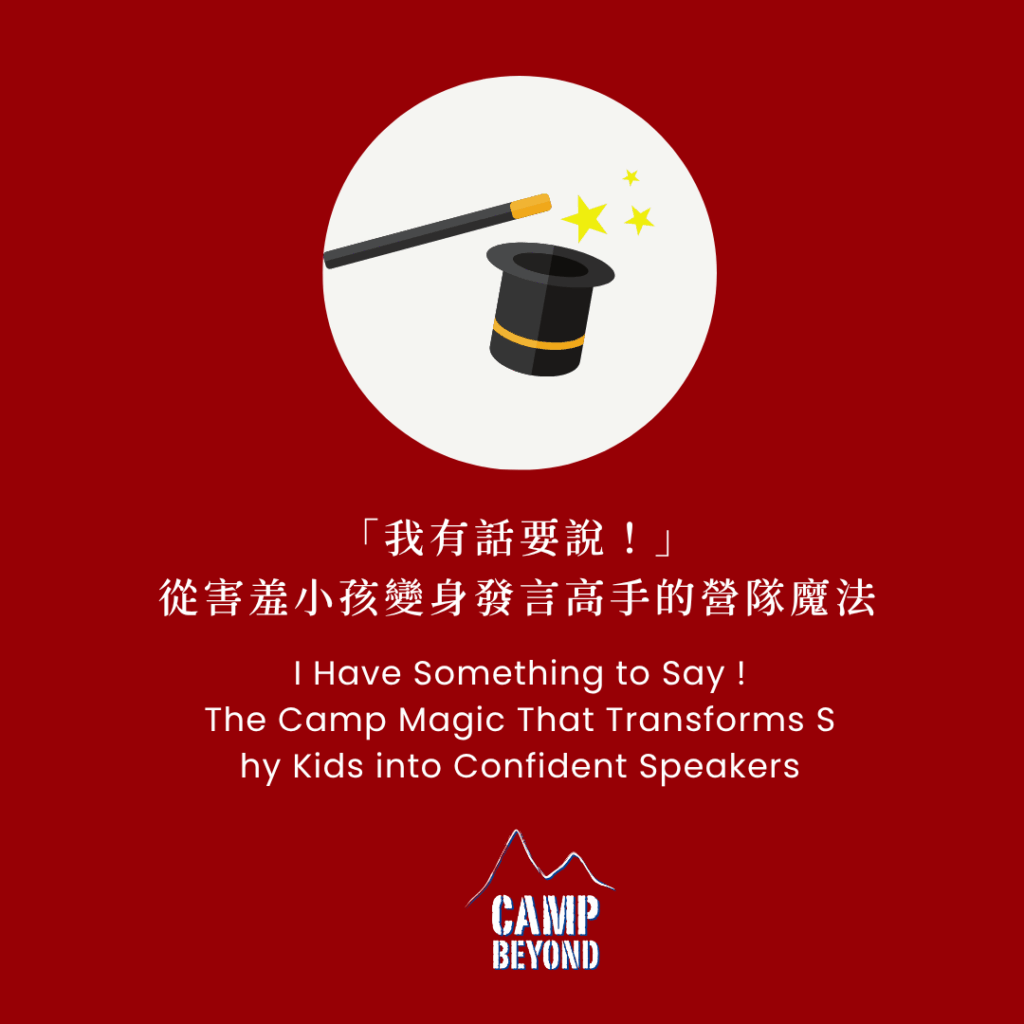在超越教育的營隊裡,我們始終相信:每個孩子都有閃閃發光的潛力,等待被看見。這份「看見」,不靠成績單的排名,而是來自孩子是否能夠——說得出來、聽得進去、做得到。

開口說話,其實是一種內在的力量
你會發現,原本害羞沉默的孩子,在營隊中開始主動發言,甚至變得健談——因為我們設計了豐富而富有挑戰的活動:
- 小組討論與輪流發言
- 專題策展與現場發表
- 實地採訪與角色扮演
- 團隊任務與解決問題的合作
當孩子擁有可以發聲的主題、有畫面可分享,也有被傾聽的空間,他們會自然地說出:「我覺得……」「我發現……」「我想試試看……」這些聲音,正是自信開始發芽的證據。而這份表達的勇氣,會成為孩子面對未來世界的重要資產。
理解與回應,是與他人連結的關鍵能力
表達自己很重要,但學會聽懂別人,也同樣關鍵。在營隊的學習過程中,孩子經歷:
- 合作任務中傾聽隊友的需求
- 討論活動中學習尊重不同意見
- 引導式對話中練習溝通與反思
沒有標準答案,只有一起完成任務的夥伴。在這樣的環境中,孩子逐漸明白:「聽懂別人,比搶答更有力量。」
那些沉默的背後,也許藏著不易說出的壓力
有時候,我們會發現孩子始終不願意開口,甚至抗拒參與討論或表達自己的想法。這樣的情況,並不代表他們沒有話要說,而是——說不出口。
可能的原因包括:
- 害怕說錯話、被嘲笑或批評
- 曾經在分享中被否定,留下陰影
- 不擅長組織語言,表達困難
- 面臨人際衝突或課業壓力,心中充滿焦慮
這時候,我們更需要問的是:
如果孩子正承受著壓力或人際上的挑戰,我們能怎麼幫助他們走出沉默?
面對壓力與難題,孩子更需要被理解的溫暖
在超越教育,我們相信——語言不只是溝通的工具,更是孩子探索自我與建立關係的重要橋樑。因此,營隊活動設計不僅重視表達能力的培養,也著重在心理與情緒的支持。
孩子在營隊中,可能會經歷這些狀況:
- 覺得自己不夠好,陷入自我懷疑
- 因衝突受挫,不知道如何修補關係
- 面對壓力卻無法開口,只能悶著情緒
我們這麼做,陪孩子走過難關:
- 透過體驗式任務,把壓力管理變得具體又可操作
- 以品格教育為核心,引導孩子認識自我、尊重他人
- 在反思與回饋時間,讓孩子說出感受、釐清內在狀態
當孩子發現:「我的感受是可以被理解的」、「我可以學會面對困難」,他們才會真正地向外打開,也開始向內建立安全感與自我價值。
真正的成長,是學會勇敢,而不是變得完美
每一次營隊結束,讓我們最感動的,不只是孩子能夠說得更多、寫得更好,而是他們:
- 更願意站出來表達自己的立場
- 更能理解他人的情緒與需求
- 更相信自己的聲音,是有價值的
許多家長回饋:「孩子變得更有勇氣,也更願意傾聽別人。」這樣的改變,不是技巧,而是態度;不是一時,而是長遠。
因為在這裡,孩子不是被批評或催促,而是被看見、被理解、被鼓勵。
在超越教育,我們相信:
真正的教育,不只是短暫的進步,而是一輩子都受用的成長。
讓孩子在這個夏天,找到表達的勇氣、傾聽的能力,以及——面對世界的信心與力量。
From Shy to Strong: How Summer Camp Helps Kids Speak Up
At Beyond Education, we firmly believe that every child holds a unique, shining potential—just waiting to be seen. And that kind of recognition doesn’t come from test scores or report cards, but from whether a child can speak up, listen well, and take action.
Speaking Up Is a Powerful Inner Strength
You might notice that once-reserved and quiet children begin to speak more actively during camp—even becoming surprisingly talkative. That’s not by accident. Our program is filled with engaging, hands-on, and thoughtfully designed activities such as:
- Group discussions with shared speaking time
- Projects and live presentations
- On-site interviews and role-playing
- Team missions requiring creative collaboration
When children have meaningful topics to talk about, vivid experiences to share, and a supportive space to be heard, they naturally begin to say things like:
“I think…” “I noticed…” “I want to try…”
These simple statements are early signs of growing self-assurance. And this courage to express oneself becomes a critical strength as they grow into the world.
Understanding and Responding: The Key to Real Connection
While expressing one’s thoughts is important, learning to truly listen is equally essential. Throughout the camp, children experience:
- Listening to teammates’ needs in collaborative tasks
- Respecting differing opinions during open discussions
- Practicing reflection and meaningful communication in guided dialogues
There are no fixed answers—only challenges to overcome together. In this environment, children gradually come to realize:
“Understanding others is more powerful than having the quickest answer.”
Behind the Silence, There May Be Unspoken Struggles
Sometimes, we see children who hesitate to speak, avoid discussion, or withdraw from sharing their thoughts. It doesn’t mean they have nothing to say—it means they don’t know how to say it.
Some possible reasons include:
- Fear of saying the wrong thing, being laughed at or judged
- Past experiences of being dismissed or misunderstood
- Difficulty organizing their thoughts and expressing themselves
- Anxiety caused by peer conflicts or academic pressure
In these moments, the real question becomes:
If a child is facing internal stress or social challenges, how can we help them break their silence?
In the Face of Pressure, What Kids Need Most Is Understanding and Compassion
At Camp Beyond, we see language not just as a communication tool, but as a bridge—helping children explore themselves and build authentic relationships. That’s why our camps focus not only on language skills, but also on emotional support and psychological safety.
Children may encounter situations such as:
- Feeling “not good enough” and falling into self-doubt
- Struggling with conflicts and unsure how to mend relationships
- Bottling up stress, unable to open up or share emotions
Here’s how we walk alongside them through those challenges:
- Turning stress management into hands-on, kid-friendly tasks
- Rooting everything in character education, helping children reflect and connect with others
- Providing dedicated time for reflection and feedback, allowing children to identify, name, and understand their emotions
When a child realizes, “My feelings can be understood,” or “I can learn how to face this,” they begin to open up—not just to others, but also to themselves, building inner security and self-worth.
True Growth Means Learning to Be Brave, Not Perfect
What moves us the most at the end of every camp isn’t just that the children speak more or write more beautifully. It’s seeing that they:
- Are more willing to stand up and share their own views
- Are better at understanding others’ emotions and needs
- Have begun to believe that their voice truly matters
Many parents tell us, “I didn’t expect this—my child came home more courageous, and more willing to listen.”
That kind of transformation isn’t about technique. It’s about mindset. It’s not momentary—it’s lifelong.
Because here, children aren’t rushed, judged, or criticized.
They are seen, understood, and encouraged to try.
At Beyond Education, we believe:
True education isn’t about temporary improvement, but about lifelong growth.
This summer, let your child discover the courage to express, the ability to listen, and—most importantly—the confidence to face the world.